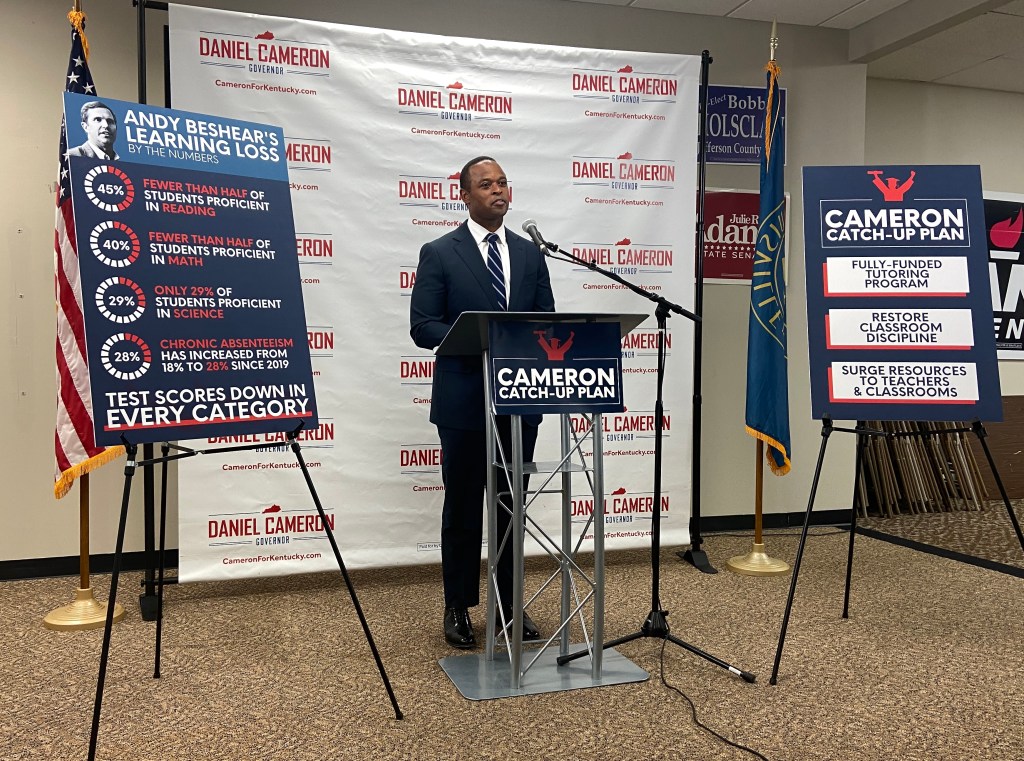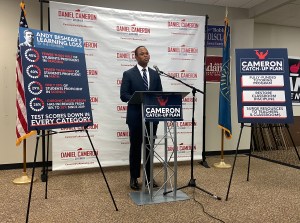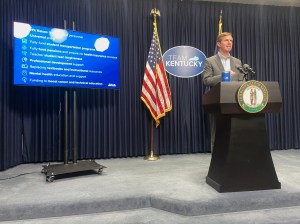Cameron, Beshear present dueling education plans
Published 4:10 pm Wednesday, August 16, 2023

- Attorney General Daniel Cameron, Republican candidate for governor, presents “Cameron’s Catch Up Plan” on Tuesday at the Jefferson County Republican Party headquarters.
This week, both gubernatorial candidates presented their plans for education if elected governor.
For years, Kentucky has been falling behind in education, with steadily dropping test scores and increasing teacher vacancies.
In 2019, 40% of fourth-graders and 29% of eighth-graders were proficient in math. In 2022, those figures had dropped to 33% and 21%, respectively, according to the National Assessment of Educational Progress.
Reading was a similar story. While 35% of fourth-graders and 33% of eighth-graders were at or above proficiency levels in 2019, only 31% and 29% were in 2022.
Cameron and Beshear both said they were the candidate that would fix these issues.
Cameron’s Catch Up Plan

Attorney General Daniel Cameron, Republican candidate for governor, presents “Cameron’s Catch Up Plan” on Tuesday at the Jefferson County Republican Party headquarters.
On Tuesday, Cameron presented his three-tiered plan to address pandemic learning loss.
To start, he apologized to any teachers or administrators “for any comments that have made you feel less than valued, or have led you to have serious misgivings about the Republican Party on the topic of education.”
Cameron was likely referring to former Republican Gov. Matt Bevin, who was known to be critical of educators. Cameron said he would helm a Republican party under new leadership that intends to be the education party for decades to come.
The first part of Cameron’s plan is a 16-week tutoring program for students who fall behind their grade level in math and reading. It would take place during the summer break and after school in one-on-one and small group settings.
Participating teachers would receive bonuses. The program would also recruit education students from state universities to help, offering them a stipend for their work.
The second part of the plan is restoring classroom discipline.
Since the pandemic began, student behavior has also taken a nosedive. An Education Advisory Board survey found that 81% of superintendents noted an increase in bad behavior since the pandemic.
The Kentucky legislature passed a bill this year aimed at giving teachers more tools to deal with discipline issues.
Among other provisions, it allows teachers to remove disruptive students from their classroom and gives students the option to be placed in an alternative education setting, like virtual learning, instead of expulsion.
“It’s a good start to a serious problem,” Cameron said.
His role as governor would be to continue offering those tools, as well as enforce a 2019 law requiring every school to have a school resource officer.
The law has been difficult for many districts to comply with, since it was an unfunded mandate, but Cameron said his administration will fulfill their needs.
Third, the Cameron Catch Up Plan would bring additional resources into classrooms, he said.
Cameron said that Kentucky is ranked one of the worst in the nation on return on educational investment. He hopes to remedy that by reducing things like paperwork and professional growth programs that take time away from teaching.
With the help of the legislature, Cameron would also establish a $41,500 starting salary for educators. While this is not an across the board raise, he said that he hopes the move has a “ripple effect” ultimately leading to raises for more experienced educators.
Cameron anticipates the total cost of his plan to hover around $100 million, but noted that he is willing to spend more as needed.
“Now this is a large undertaking and it will not be without significant cost, but I can think of no higher purpose than fulfilling our obligation to provide a quality education to every Kentucky student,” he said. “Bold ideas are needed when the stakes are this high.”
Beshear’s Education Budget Proposal

Gov. Andy Beshear presents the education highlights of his 2024-26 proposed budget on Wednesday in Frankfort.
A day after Cameron’s presser, Beshear held his own to share his education plans if reelected.
He noted education gains achieved during his tenure to start, which include modest educator raises, full day kindergarten and over $245 million investment in career and technical education.
Beshear said that Kentucky’s investment in education has not kept up with its economic investment, which will become a problem when filling the workforce demand in the coming decades.
He blamed the General Assembly for failing to make this historic investment in past budgets.
“Each of my years as governor, we have proposed a robust budget, significant funding for public education, and while the General Assembly has done some, they have not nearly gone far enough,” he said.
Beshear’s budget proposal includes:
- 11% pay raises for all school personnel;
- universal Pre-K for all 4-year olds, to increase kindergarten preparedness and allow parents to return to work/avoid childcare costs;
- fully funded student transportation programs;
- fully funded pensions and assurance of no health insurance premium increases;
- teacher student loan forgiveness;
- professional development support;
- mental health education and support;
- $100 million of additional funding to boost career and technical education; and
- replacement of textbooks and instructional resources.
The pay raises would be across the board, including for classified staff like bus drivers and cafeteria staff.
According to the National Education Association, as of April 2023, Kentucky ranked 44th in the nation for average starting pay and 40th in average teacher salary.
With the pay raise, the average starting salary would increase from $40,000 to $44,500, and the average teacher salary would grow from $56,000 to $62,000, according to Kentucky Department of Education salary figures.
“Hiring and retaining educators is critical, and we are in a competition for talent,” Beshear said.
“It’s simple. You can’t catch a kid up on math without a math teacher and we cannot remain competitive with other states if we don’t pay teachers closer to what they’re worth.”
The salary increases alone will cost $1.1 billion over two years.
John Hicks, secretary of the executive cabinet and budget director, said that there is room for this in the budget.
Right now, recurring revenues exceed recurring expenses by $1.4 billion, and the state is anticipating an additional billion dollar surplus on top of that, Hicks said.
Beshear took aim at Cameron’s starting salary increase proposal.
“When all you do is raise the starting salary, it creates compression and you lose teachers that may have three, four, five, six or seven years of experience when they’re paid almost the exact same thing as someone who is brand new,” he said.
Cameron, on the other hand, said that Beshear doesn’t have the relationships with the legislature to get his budget proposal passed. He said he got legislators’ buy-in before presenting his plan.
In light of recent JCPS busing issues, Beshear commented that the legislature has not fully met districts’ student transportation budget requests in recent years. His budget plan would include the full amount.
“Now we’re seeing the impact of that decision with major transportation issues that have disrupted learning for many of our students,” Beshear said. “… If you don’t fund what it costs to bus our students, and you don’t have competitive salaries to have enough bus drivers, yes, you are going to have problems.”

